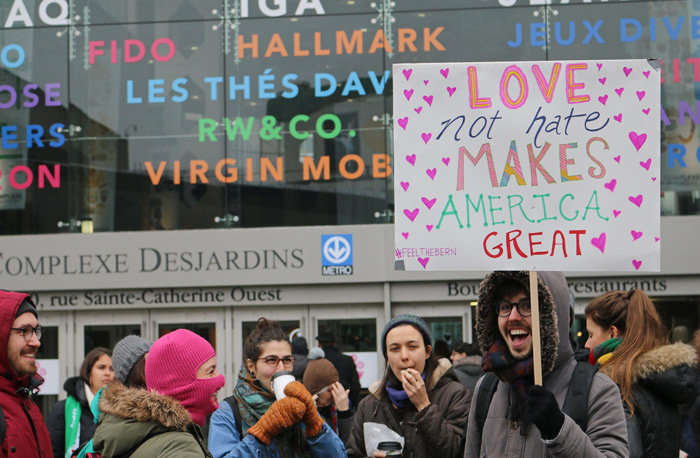Crowds of more than 500,000 people gathered on the National Mall in Washington D.C. on Saturday, Jan. 21 to take part in the Women’s March on Washington. It was one of 673 marches throughout the world.
Occurring just one day after the inauguration of President Donald J. Trump, the marches were conducted by individuals from all corners of the world to send a message of power, resistance, and solidarity to the new administration.
The protesters were against Trump’s behaviour and policies. Based on a transcript with Billy Bush, Trump has reportedly condoned sexual assault of women. In addition, many women have issues with his intention to deny access to planned parenthood and his anti-abortion stance.
The streets were full of pink-knit hats, cleverly-crafted posters, and chants of dissent. By 9 a.m., the mall was packed and people were eager to rally. An hour later, the event commenced with a speech by Honduran-American actress America Ferrera.
“We will not go from being a nation of immigrants to a nation of ignorants,” Ferrera said to cheers of support.
Among the attendees of the Women’s March, there was a consensus about the importance of mobilization and resistance. A husband and wife, who asked to remain anonymous, had driven down from Long Island NY to participate in the event. The wife, who marched in Washington D.C. in 1970 to protest the Vietnam War, was deeply moved by the civil societal participation.
“It’s a repudiation of everything that Trump stands for,” the couple said. “What he stands for does not represent our America. Our strength is our diversity.”
Another marcher, Hannah – who declined to disclose her last name – travelled across the country from Oregon and was marching for her grandmother, who had passed away from lung cancer before she had the chance to vote for Hillary Clinton. When considering the next four years with Trump in the White House, Hannah was reminded of the fascist movements that swept the world in the 1940s.
“I see what people mean when they say [we’re] trading the moustache for the toupee,” Hannah said.
Hannah was not alone in her sentiments. Activist, writer, and feminist icon Gloria Steinem spoke against the new president, standing before crowds of admirers in Washington. During the march, she emphasized the importance of keeping the power in the hands of the people.
“I have met the people, and you [Trump] are not them,” Steinem said.
Over 30 “sister marches” were organized across Canada. In Montreal, nearly 5,000 people gathered at Place des Arts for Manif des Femmes, marching in solidarity with Washington.
Sarah Wimmer, U1 Arts, was one of the protesters at the Montreal event. Wimmer found that the most moving aspect of the march was when women were asked to raise their hands if they had ever been sexually assaulted. Countless hands rose in the air.
“I marched because I know change doesn’t come from silence, and uniting with all of the millions of other marchers proves that one man won’t be able to divide us,” Wimmer said.
A speaker at the event, Rachel Zellars, executive director of the Girls Action Foundation and a PhD candidate in the Department of Integrated Studies in Education at McGill, spoke at the event. She highlighted the value of collective action and unification in a time of such distress.
“Today signifies the end of our grieving because right at this very moment [673] other women’s marches are happening globally,” Zellars said. “We have never needed one another so much as in this very moment.”








